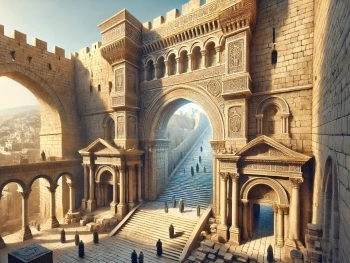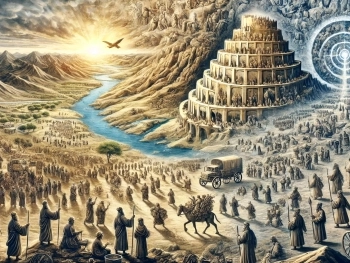Ancient World Questions. Uncover Historical Insights and Biblical Connections
Delve into our curated list of questions about the ancient world, exploring historical insights and their biblical connections. Perfect for history buffs and Bible scholars alike. Discover the answers today!

Why Do the Huldah Gates Appear Different in Ancient Replicas and Modern Photos?
The Huldah Gates, located on the southern wall of the Temple Mount in Jerusalem, are a significant archaeological and historical feature. These gates served as entrances and exits for worshippers ascending to the Temple during the Second Temple perio...

What Is the Origin of the Japanese and Chinese Peoples? A Biblical Perspective
The question of the origins of nations and peoples has fascinated humanity for centuries. From a biblical perspective, the origins of all nations can be traced back to the descendants of Noah’s three sons—Shem, Ham, and Japheth—following the gr...
How did the ancient Greeks and Romans practice medicine and treat illnesses?
The ancient Greeks and Romans left a lasting legacy in the field of medicine, with their innovative theories and treatments that shaped the foundations of Western medicine. Drawing upon a combination of empirical observations, philosophical insights,...
What were the major contributions of ancient Babylon to mathematics and astronomy?
The ancient city of Babylon, located in Mesopotamia, made significant contributions to the fields of mathematics and astronomy. With a keen interest in celestial observations and a sophisticated numerical system, the Babylonians developed groundbreak...
How did the ancient Persians create and administer their vast empire?
The ancient Persian Empire, known for its grandeur and administrative prowess, stands as a testament to the organizational genius of its rulers. From the Achaemenid to the Sassanian dynasties, the Persians created and administered a vast empire that ...
What were the cultural and artistic achievements of ancient India, particularly during the Gupta Empire?
The Gupta Empire, which thrived from the 4th to the 6th century CE, witnessed a golden age of cultural and artistic achievements in ancient India. Known for its patronage of the arts, literature, science, and philosophy, the Gupta Empire left an inde...
How did ancient civilizations like the Incas and Aztecs build their remarkable cities and structures?
The ancient civilizations of the Incas and Aztecs left behind awe-inspiring cities and structures that continue to captivate our imagination. From the grandeur of Machu Picchu to the imposing pyramids of Teotihuacan, these remarkable achievements in ...
What were the major trade routes and trading practices of the ancient world?
Trade played a vital role in connecting civilizations and fostering cultural exchange in the ancient world. From the bustling markets of Rome to the Silk Road that stretched across Asia, ancient trade routes facilitated the exchange of goods, ideas, ...
What was the role of slavery in ancient societies like Rome and Greece?
Slavery was deeply ingrained in the social and economic fabric of ancient Rome and Greece, shaping the structure of these societies in significant ways. With vast numbers of enslaved individuals serving as laborers, domestics, and even skilled profes...
How did the ancient Mayans develop their sophisticated calendar system?
The ancient Mayan civilization, renowned for its advanced understanding of astronomy and mathematics, developed a highly sophisticated calendar system that remains a testament to their intellectual prowess. Through intricate observations of celestial...
What were the key events and significance of the Battle of Thermopylae in ancient Greece?
The Battle of Thermopylae stands as one of the most iconic and consequential battles in ancient Greek history. Fought in 480 BCE between an alliance of Greek city-states led by King Leonidas I of Sparta and the Persian Empire under King Xerxes I, thi...
What was life like for women in ancient Rome?
Ancient Rome is often associated with grand architecture, legendary emperors, and mighty legions. However, the daily life of women in ancient Rome remains an intriguing and less-explored aspect of this civilization. While gender roles and expectation...
How did the ancient Egyptians build the pyramids?
The pyramids of Egypt stand as iconic symbols of ancient Egyptian civilization, representing remarkable architectural and engineering achievements. Constructed as tombs for pharaohs, these colossal structures continue to captivate the world with thei...
What were the major gods and goddesses worshipped in ancient Greece?
Ancient Greek mythology was rich with a pantheon of gods and goddesses, each associated with various domains, powers, and legends. Here are some of the major deities worshipped in ancient Greece: Zeus: The king of the gods and the ruler of Mount Olym...
How did ancient Chinese society and culture differ from Western civilizations?
Ancient Chinese society and culture exhibited several notable differences from Western civilizations. Here are some key distinctions: Philosophical Traditions: While Western civilizations developed philosophical systems such as Greek philosophy and l...
What were the significant contributions of ancient Mesopotamia to civilization?
Ancient Mesopotamia, the land between the Tigris and Euphrates rivers, made significant contributions to the development of civilization. Here are some of its notable achievements: Writing System: Mesopotamia is credited with the invention of one of ...
How did the ancient Romans manage their water supply and sewage systems?
The ancient Romans were remarkable engineers when it came to managing water supply and sewage systems. They developed sophisticated systems that provided clean water for public use and efficiently removed wastewater from cities. Water Supply: Aqueduc...
What were the religious beliefs and practices of the ancient Egyptians?
The religious beliefs and practices of the ancient Egyptians were complex and deeply intertwined with their daily lives. Here are some key aspects: Polytheistic Belief: Ancient Egyptians believed in a pantheon of gods and goddesses who governed vario...
About
Welcome to Free Bible: Unearthing the Past, Illuminating the Present! Step into a world where ancient history and biblical narratives intertwine, inviting you to explore the rich tapestry of human civilization.
Discover the captivating stories of forgotten empires, delve into the customs and cultures of our ancestors, and witness the remarkable findings unearthed by dedicated archaeologists.
Immerse yourself in a treasure trove of knowledge, where the past comes alive and illuminates our understanding of the present.
Join us on this extraordinary journey through time, where curiosity is rewarded and ancient mysteries await your exploration.
Recent posts
-

Faith Through Art: Bible Craft Ideas for Teens and Children
Faith can take many forms—spoken, sung, or even painted. For teens and children, expressing spirituality through art is a hands-on way to explore biblical themes while having fun and developing creative skills. Crafting allows young believers to interact with stories, symbols, and lessons in a way that feels personal and... -

The Kings of Persia in the Bible: Historical and Theological Perspectives
The Persian Empire looms large in the latter chapters of the Hebrew Bible, not only as a dominant world power but as an unexpected instrument of divine will. While ancient empires like Egypt, Assyria, and Babylon are often depicted as oppressors of Israel, the kings of Persia occupy a more... -

Babylon, Persia, and the Exile: How Iran Shaped Jewish Identity
The Babylonian exile is often seen as one of the darkest moments in Jewish history—a time of destruction, displacement, and despair. Yet, it was also a transformative period, one that reshaped Jewish faith, practice, and identity in profound ways. While Babylon (in modern-day Iraq) was the setting for exile, it... -

Zion and Susa: Two Sacred Cities in Dialogue Through History
At first glance, Zion—the biblical name for Jerusalem—and Susa—the ancient royal city of Persia—seem worlds apart. One is the spiritual heart of the Hebrew Bible and Jewish tradition; the other, a seat of imperial power in ancient Iran, known from royal inscriptions and palatial ruins. Yet within the pages of... -

Apocalyptic Visions and Persian Power: Iran in the Books of Daniel and Ezra
Ancient Persia—modern-day Iran—plays a pivotal but often underexplored role in the prophetic and apocalyptic literature of the Hebrew Bible. Two books in particular, Daniel and Ezra, shed light on the complex intersection of divine vision and imperial rule. Set against the backdrop of Persian dominance, these texts offer both a...
Main Menu
- Ancient Assyrian Social Structure
- Ancient Babylonia
- Ancient Canaan During the Time of Joshua
- Ancient History Timeline
- Ancient Oil Lamps
- Antonia Fortress
- Archaeology of Ancient Assyria
- Assyria and Bible Prophecy
- Augustus Caesar
- Background Bible Study
- Bible
- Biblical Geography
- Fallen Empires - Archaeological Discoveries and the Bible
- First Century Jerusalem
- Glossary of Latin Words
- Herod Agrippa I
- Herod Antipas
- Herod the Great
- Herod's Temple
- High Priest's in New Testament Times
- Jewish Literature in New Testament Times
- Library collection
- Map of David's Kingdom
- Map of the Divided Kingdom - Israel and Judah
- Map of the Ministry of Jesus
- Matthew Henry Bible Commentary
- Messianic Prophecy
- Nero Caesar Emperor
- Online Bible Maps
- Paul's First Missionary Journey
- Paul's Second Missionary Journey
- Paul's Third Missionary Journey
- Pontius Pilate
- Questions About the Ancient World
- Tabernacle of Ancient Israel
- Tax Collectors in New Testament Times
- The Babylonian Captivity
- The Black Obelisk of Shalmaneser
- The Books of the New Testament
- The Court of the Gentiles
- The Court of the Women in the Temple
- The Destruction of Israel
- The Fall of Judah with Map
- The History Of Rome
- The Incredible Bible
- The Jewish Calendar in Ancient Hebrew History
- The Life of Jesus in Chronological Order
- The Life of Jesus in Harmony
- The Names of God
- The New Testament
- The Old Testament
- The Passion of the Christ
- The Pharisees
- The Sacred Year of Israel in New Testament Times
- The Samaritans
- The Scribes
Ancient Questions
- How did the ancient Romans manage their water supply and sewage systems?
- Did the Ancient Romans Dine at a Table?
- Why Did the Goddess Diana have so many Breasts?
- What Historical Sources do we have for the Life of Alexander the Great?
- Is the Black Sea Mentioned in the Bible?
- What were the major trade routes and trading practices of the ancient world?
- What was a Roman Centurion?
- Who was Jupiter in Roman Mythology?
- What was a Roman Legion?
- Is the Hebrew Text on the Scroll of Isaiah Accurate?
Bible Study Questions
- The Five Key Visions in the New Testament
- What is the significance of the Sermon on the Mount?
- The Darby Bible: A Detailed Historical Analysis
- What is the biblical understanding of justice and righteousness?
- The Wycliffe Bible: Translation Methodology, the Lollard Movement, and the Church’s Response
- How do we approach and study prophetic literature in the Bible?
- How can we apply biblical principles to our daily lives?
- How do we understand the concept of sin and its consequences?
- What is the role of faith in the life of a believer?
- What is the biblical perspective on suffering and trials?